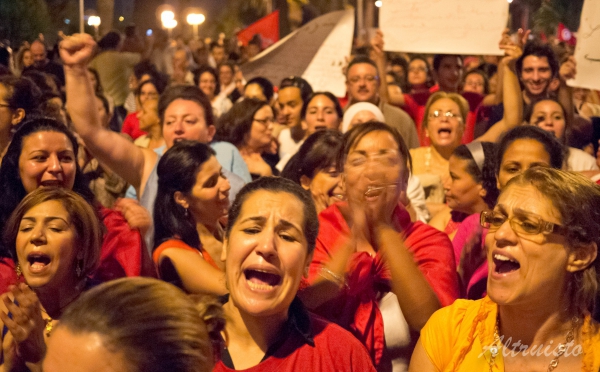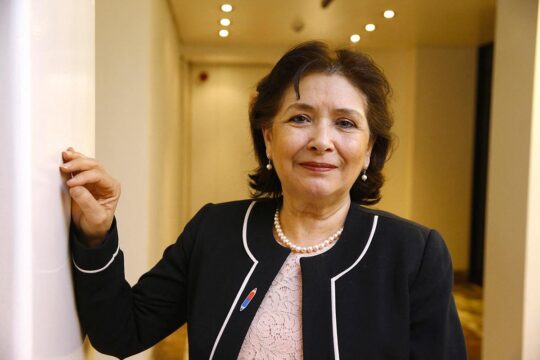“L”, the woman hiding in the cupboard, lived semi-hidden for 17 years. To protect her political activist husband wanted by ex-president Ben Ali’s police, she made a one-metre wide cavity in a wall behind a cupboard and hid her husband there. In the meantime she fell pregnant, something that could lead the police to her husband. She had no option but to hide with him, her baby and three other children in the hole behind the cupboard.
“M” was only 20 years old when in the mid-1990s she crossed the desert with two small children to join her husband in neighbouring Algeria. Her husband had fled to a shack at the bottom of an Algerian friend’s house after being badly tortured in the jails of the ex-president.
During their twelve years in Algeria, the family grew up completely closeted. The civil war made their situation even more complicated. “M” raised her children in silence, banning them from crying and shouting, and trying from behind thick, closed shutters to educate them and tell them about the noisy world outside.
“S” spent nearly half her life taking food to her husband, who was constantly being transferred from one prison to another across the whole of Tunisia, from north to south. She worked hard and managed brick by brick to build their house, which she registered in her husband’s name. When he got out of jail he divorced her, took a new, younger wife, and gave her only the cellar of the house.
Only 10 % women testifying
Poignant stories like these are among the testimonies filed since December 2014 with Tunisia’s Truth and Dignity Commission (Instance Vérité et Dignité, IVD).
The list of abuses against Tunisian women opponents of Ben Ali, or wives, sisters and mothers of opponents is very long. They include daily harassment from police entering their homes at any hour day or night, deprivation of income, having to bring up children alone, being forced by pressure from the authorities to divorce a loved husband. Women themselves were also jailed, tortured, raped. Stigmatized by a traditionalist society after time in prison, they were often banned from working, banned from high schools, universities and even hospitals, including when seeking care for small babies.
Yet out of the 18,000 cases filed with the IVD by November 2015, only 15% relate to women. Since last May, when public audiences started at the IVD offices, only 10% of victims coming to testify have been women.
“Women were often indirect victims of the dictatorship, but they don’t even realize it, because Tunisian women are self-sacrificing,” says Ibtihel Abdellatif, head of the IVD women’s committee. “Some women who were victims of the repression do not have access to the necessary information, while others live far from the capital and do not have the means to take part in hearings. We also know that they are often afraid to testify about what they suffered in detention, for fear of being stigmatized.”
According to a report by the Transitional Justice Barometer, husbands, brothers, fathers and Tunisian men in general do not encourage women to go and testify, especially about sexual violence. Although as early as 1956 Tunisia granted women among the most advanced rights in the Moslem world, many social pressures continue to weigh on them and hamper their moves towards real autonomy.
Speaking out lest we forget
“Right from the start of the national transitional justice dialogue in 2012 that brought victims’ associations and civil society together to consult on the draft Transitional Justice Law, very few women took part,” says Rim El Gantri, head of the International Center for Transitional Justice (ICTJ) office in Tunis.
Hence the idea in September of a “transitional justice network for women too”. This network, which aims to bring a real gender component into Tunisia’s transitional justice process, is made up of some 15 women’s associations across the country federated under a charter. It is piloted by ICTJ through training workshops aimed at encouraging women to become more generally involved in the process, to testify on human rights abuses committed during the dictatorship and file cases before the deadline for this phase.
The Tounissiet (Tunisian Women) Association is a member of the Network, whilst also having its own project entitled “Victims of the Past, Leaders of Tomorrow”. This programme is supported by the UN Development Programme (UNDP), the office of the UN High Commissioner for Human Rights and ICTJ expertise. In an attempt to overcome women’s reluctance and trauma, Tounissiet meets them in their own spaces, such as family planning centres across the country, to help them understand the reconstructive justice process and familiarize them with their rights as direct or indirect victims.
Ibtihel Abdellatif is counting on both the mobile listening units that will soon be set up and the new IVD regional offices to gather the voices of women, which, she says, have hardly been heard in other transitional justice processes. Some women victims have already agreed to testify in public hearings.
“We are now working to provide these women with the guarantees and protection necessary so they do not end up doubly victimized and doubly stigmatized,” she says.
Perhaps one day the stories of “L”, the woman hiding in the cupboard, and “M”, the mother who brought her children up in silence, will be the subject of a prime-time television programme. It is only then that their lives will emerge from the shadows and not be forgotten.






